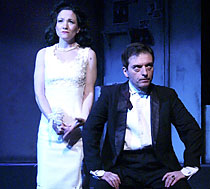In Warren Leight’s semi-autobiographical
play "Side Man," the subject is talented trumpeter
Gene Glimmer, whose passion for his music eclipses his love for
his wife and child.
In the 1940s, a sideman was a jazz musician who went from gig
to gig playing backup for bandleaders or solo singers. The playwright’s
own father was the trumpeter Don Leight (who died last January
at age 80).
Leight’s play, starring John Blaylock as Glimmer, is now being
staged at the Gallery Players, directed by Heather Siobhan Curran.
Narrated by Gene’s son, Clifford (named after the famed trumpeter
Clifford Brown), "Side Man" depicts the death of the
great jazz bands and the decline of Gene’s marriage to Terry
(Erin Kate Howard). Clifford (Jason Winfield), a collage artist,
reconstructs the past much as he creates his art – piece by piece.
If Gene is the central figure in the plot – the man whose passion
turns into a poison to those closest to him – it is Clifford,
moving gracefully in and out of the action, who is the glue between
the spaces of the 30 years that separate the present from the
distant past. The young man, who has come back to his father’s
favorite gig, The Melody Club, to say goodbye before taking off
for the West Coast, makes wry comments on the vicissitudes of
his parents’ lives: his mother’s descent from a plucky, somewhat
naive New York transplant from East Boston into a harridan suffering
from alcoholism and insanity; and his father’s inability to connect
with his wife, his son or any aspect of life save his music.
Winfield’s performance has both good and not-so-good aspects.
At times his detachment prevents "Side Man" from falling
into the kind of melodrama that characterizes daytime television.
On the other hand, there are moments when Winfield’s ambling
into the scene breaks into the heat of the drama at the exact
point when it is most compelling.
At any rate, it is Blaylock, with his clueless good nature, and
Howard, whose passionate performance is the anchor of the dramatic
action, who delivered the outstanding performances of the evening
for this reviewer. Winfield seemed more like Thornton Wilder’s
disengaged stage manager for most of the play.
Other fine performances are turned in by Amy Smith as Patsy,
the kind-hearted waitress who goes through husbands like a chain
smoker goes through cigarettes, and Gene’s three cronies: Al
(D. H. Johnson), Ziggy (Patrick Toon) and most especially the
one-eyed heroin addict Jonesy (Daniel Damiano).
Cully Long’s set, central to the success of this show, allows
the characters to move from past to present, from the Glimmer’s
dismal apartment (furnished in "Early American Divorce,"
the detritus of friends’ failed marriages) to Jonesy’s jail cell
to The Melody Club. It also illustrates in minute detail – the
cracked paint on the Glimmer’s door, the leaky sink in the jail
cell, the worn leatherette benches in the club – the sleazy existence
of the Glimmers and their friends and at the same time has an
impressionistic quality that is truly evocative.
Martin Miller’s soundscape works beautifully with Kate Ashton’s
lighting and the set to establish the mood and make the transitions
as smooth as a jazz riff.
"Side Man," which won the 1999 Tony for best play and
was nominated for the Pulitzer Prize for drama, is the kind of
play that easily strikes a different emotional chord in different
people. Some will see Leight’s work as a lament for the decline
of jazz. (In one scene Gene and his friends watch Elvis Presley
performing on the Ed Sullivan show and comment that he will be
the one to give jazz its final death blow.)
Others will see the play as a depiction of a dysfunctional marriage
and the way it affects a young boy growing up in a house where
his father is mostly absent and the mother is all too present.
Still others will look at "Side Man" as a coming-of-age
play about a young boy who, after years of taking care of an
ailing mother and helping his father navigate through life, finally
decides to make his own way. And they will all be correct – to
some extent.
Like all good plays, "Side Man" has multiple layers,
and fortunately, the Gallery Players have been sensitive to the
ambiguity in the play and the ambivalence in the author. The
result is theater as it should be – thoughtful, provocative and
extremely moving.
The Gallery Players production of "Side
Man" plays through Dec. 12, Thursdays through Saturdays
at 8 pm and Sundays at 3 pm. Tickets are $15, $12 seniors and
children under 12. The Gallery Players is located at 199 14th
St. between Fourth and Fifth avenues. For reservations, call
(718) 595-0547 or visit www.galleryplayers.com.

























